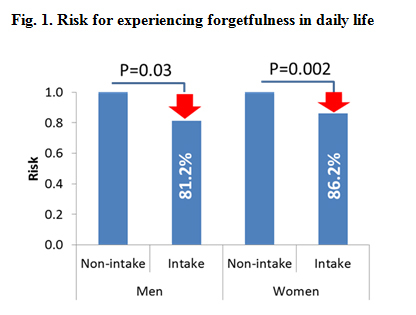TOKYO--(BUSINESS WIRE)--Morinaga Milk Industry Co., Ltd. (TOKYO:2264), Japanese leading dairy product company, today unveiled the results of a nationwide survey jointly conducted with Tokyo Healthcare University in Japan on the health status of over 20,000 middle-aged to elderly men and women for the purpose of investigating the relationship between regular consumption of calcium-fortified milk containing Bifidobacterium longum BB536 and health status.
The results reveal that subjects regularly consuming the probiotic milk were less likely to experience fractures and several diseases, and showed improvement in forgetfulness, quality of life in daily living, which supports the benefits of B. longum BB536 for anti-aging.
“The results obtained from this survey linked the continuous consumption of the probiotic milk supplemented with B. longum BB536 for reducing some disease risks, such as colon cancer, and in helping to prevent certain aging-related challenges of middle-aged to elderly people, in such areas as forgetfulness for example,” stated Dr. Taeko Shimoda, professor of Tenshi College, professor emeritus of Tokyo Healthcare University.
“Although other components in the milk, such as calcium, might have also contributed to the outcomes of the present survey, B. longum BB536 is believed to possess an important function from a point of view of improving intestinal health and the relationship with the gut-brain axis.”
The Survey Shows the Potential of Probiotic Milk Consumption for Anti-Aging
Questionnaires were distributed to middle-aged to elderly men and women aged in their 50s to 80s with or without experience of consuming “calcium fortified milk containing BB536,” from December 2013 to March 2014. A total of 92,110 questionnaires were distributed and 23,188 effective answers were received. Data analysis was performed by comparison between subjects with experience of the probiotic milk consumption for ≥ 3 years and for ≥4 times per week and subjects without experience of consumption of this probiotic milk.
Compared with the non-intake group, the probiotic milk-consuming group (intake group) showed the following;
- The proportions of subjects who had (a tendency to) constipation were lower in both men and women.
- The proportions of subjects who experienced forgetfulness (men and women), fatigue (women) and low back pain (women) in daily life were lower.
- The proportions of subjects who experienced colon polyp (men), kidney disease (women), liver disease (men) and gallstones (men) were lower.
- For women who had consumed the milk for over 10 years, fewer subjects experienced bone fractures in the past 5 years.
Risk for experiencing forgetfulness in daily life (Fig.1)
The result showed that there was a significant reduction of risk for forgetfulness by 19% (P = 0.03) and 14% (P = 0.002) for men and women, respectively, in the intake group compared to non-intake group.
B. longum BB536 (ATCC BAA-999) has been reported to be effective in normalizing anxiety-like behavior and hippocampal brain derived neurotrophic factor in mice with infectious colitis (Bercik et al., 2011). The present survey supported the possible effect of consumption of BB536 supplemented milk for improving brain health via the gut-brain axis.
Risk for developing a colon polyp
There was a significant reduction of risk for history development of a colon polyp by 26% (P = 0.003) for men in the intake group compared to non-intake group. B. longum BB536 has shown its effect in suppressing the development of carcinogenesis induced by carcinogen in male and female rats (Reddy and Rivenson,1993). In addition, intake of yogurt containing B. longum BB536 lowered the cell number of enterotoxigenic Bacteroides fragilis (ETBF), a bacteria which has been suggested to be associated with diarrheal disease, inflammatory bowel disease and colorectal cancer (Odamaki et al., 2012). The present survey suggests the possible effect of consumption of the probiotic milk supplemented with B. longum BB536 in lowering the risk of colon cancer.
Risk of experiencing bone fractures in the past 5 years
The proportion of history of bone fractures in the past 5 years was significantly lower in the intake group compared to non-intake group for women, with a significant reduction of risk for experiencing bone fractures by 16% (P = 0.04). The proportion of history of bone fractures in men was lower than that in women, and there was no significant difference between the intake and non-intake groups.
Igarashi et al. (1994) reported that a simultaneous administration of B. longum BB536 and milk calcium was more effective in improving the bone strength as compared to administration of calcium alone in rats. The present survey suggested the potential for B. longum BB536 in lowering the risk of bone fractures.
About BB536 and Morinaga
Bifidobacterium longum BB536 was isolated from human intestine and is one of the most thoroughly researched probiotic strains in the world. Morinaga has conducted research and development on BB536 for over 40 years, and achieved U.S. FDA-notified GRAS in 2009. Supported by over 110 published studies, BB536’s beneficial effects have been confirmed in such clinical areas as intestinal health, immunity, infection, and allergy.
Morinaga Milk Industry Co., Ltd. is the second largest dairy product company in Japan, founded in 1917 and employing 3,080 people. Morinaga has exhibited excellence in the field of technology and has offered not only dairy products but also other beneficial functional ingredients to the world for years. For more information, visit us at http://www.morinagamilk.co.jp/english/.
References
P. Bercik et al., The anxiolytic effect of Bifidobacterium longum NCC3001 involves vagal pathways for gut–brain communication; Neurogastroenterol Motil. 23(12):1132-9 (2011)
S. Reddy and Abraham Rivenson, Inhibitory effect of Bifidobacterium longum on colon, mammary, and liver carcinogenesis induced by 2-amino-3-methylimidazo[4,5-f] quinoline, a food mutagen; Cancer Research 53 : 3914-3918 (1993)
T.Odamaki et al., Effect of the oral intake of yogurt containing Bifidobacterium longum BB536 on the cell numbers of enterotoxigenic Bacteroides fragilis in microbiota; Anaerobe. 18(1)14-18 (2012)
M. Igarashi et al., Effect of Bifidobacterium longum and lactulose on the strength of bone in ovariectomized osteoporosis model rats; Bifidus 7 : 139-147 (1994)





